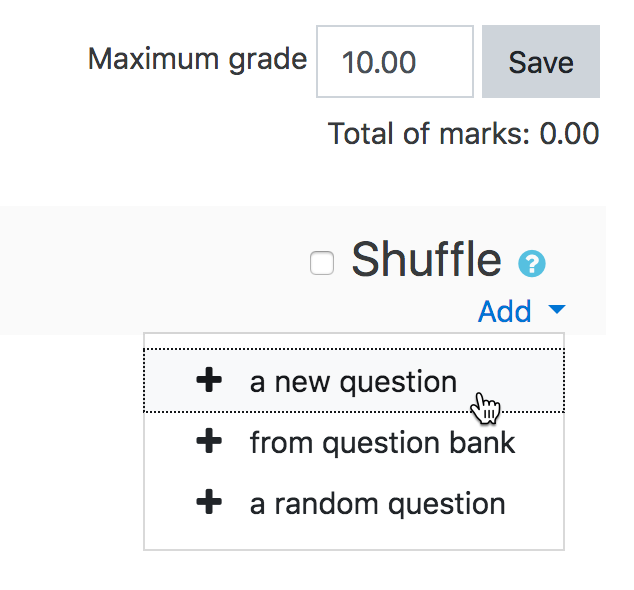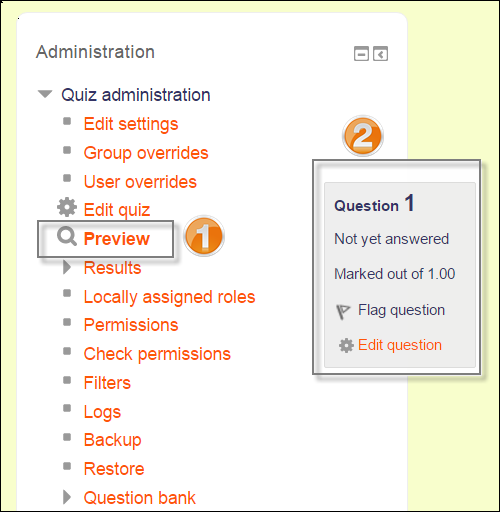Quiz quick guide: Difference between revisions
| Line 20: | Line 20: | ||
If you expand the sections in the quiz setup page and click the '''?''' icon and the 'Show more' links, you can explore alternative settings for your quiz. Here are some popular settings: | If you expand the sections in the quiz setup page and click the '''?''' icon and the 'Show more' links, you can explore alternative settings for your quiz. Here are some popular settings: | ||
''' | '''Time limit''' - if you only want to allow students a limited amount of time from when they start until they must have finished. If, instead you want students to finish by a certain date and time, set the '''Close date'''. | ||
'''How questions behave -Interactive with multiple tries''' -instead of the quiz being like a test where students only see their results at the end, this setting allows them to get immediate feedback for each question and keep trying. (Good for formative assessment.) Learn more about [[Question behaviours]]. | '''How questions behave -Interactive with multiple tries''' -instead of the quiz being like a test where students only see their results at the end, this setting allows them to get immediate feedback for each question and keep trying. (Good for formative assessment.) Learn more about [[Question behaviours]]. | ||
Revision as of 18:55, 19 November 2015
Moodle's Quiz is a very powerful activity that can meet many teaching needs, from simple, multiple-choice knowledge tests to complex, self-assessment tasks with detailed feedback. This quick guide gets you started, but if you really want to make the most of everything a Quiz can do, make sure you study the full Quiz activity documentation. For a short video introduction, see also the screencast Quiz: Automatic grading.
Before you start
- A Moodle quiz is made up of two parts: (1) a set up page or 'front cover' where you add the criteria for the quiz, such as grading and time limits, and (2) the questions themselves. The questions are stored separately from your quiz in a course Question bank. This means you can reuse your questions in a later quiz. It also means you could display an empty quiz (a 'front cover' with no questions added) on your course page, so be careful!
- Some people prefer to make their quiz questions separately first and then add them to a quiz 'front cover' later. If you would like that, then look at the documentation on Question bank or just read on below until we get there!
Set up the quiz 'front cover'
- In the course where you want your quiz, turn on the editing and from the Activity Chooser, select 'Quiz'.
- Give it a name and if desired, a description telling students what the quiz is about.
- If you want, you can now scroll down to the bottom of the page, click 'Save and display' and start adding questions. (Go to the section 'Add your questions' below.)
Default settings for your quiz
If you don't change anything on the quiz setup page (your 'front cover'), then your quiz will work like this:
- It will not have a time limit and students can take it as many times as they wish, with the recorded grade being their best attempt.
- Each question will be on a different page and they can move freely between previous and later questions.
- Students won't know their score or get feedback until they complete the quiz.
To change some of those settings, read on:
Quiz settings
If you expand the sections in the quiz setup page and click the ? icon and the 'Show more' links, you can explore alternative settings for your quiz. Here are some popular settings:
Time limit - if you only want to allow students a limited amount of time from when they start until they must have finished. If, instead you want students to finish by a certain date and time, set the Close date.
How questions behave -Interactive with multiple tries -instead of the quiz being like a test where students only see their results at the end, this setting allows them to get immediate feedback for each question and keep trying. (Good for formative assessment.) Learn more about Question behaviours.
Overall feedback -completing this will give your students customised feedback according to what grade range they obtained.
Add your questions
So you have completed the quiz set up page and clicked 'Save and display:
1. Click the button 'Edit quiz'
2. Click 'Add' on the right and then click '+ a new question'. (If you already made questions in the question bank, then click '+ from question bank'.)
3. Choose the type of question you want to add and then click 'Add'.
4. Add your question. If you need help, click the documentation link at the bottom of your question page or explore the Question types documentation.
5. Click 'Save changes' when you have made your question.
6. Repeat steps 2- 5 for as many questions as you need.
Getting your quiz ready for students
Once you have added all the questions you need, your quiz is ready for students and will already be visible on the page (unless you hid it while you were setting it up.)
It is a good idea to preview your quiz by clicking in the block Administration>Quiz administration>Preview. (1 below) You can then check for any oversights and edit a question directly from a link provided (2 below):
Viewing quiz results
To see the grades once students have done your quiz, you can either:
- click the quiz itself and then the link 'Attempts =' (where the number is the number of attempts) - or -
- click the quiz and then from the block Administration>Quiz administration, expand 'Results' and select the analysis you need.

